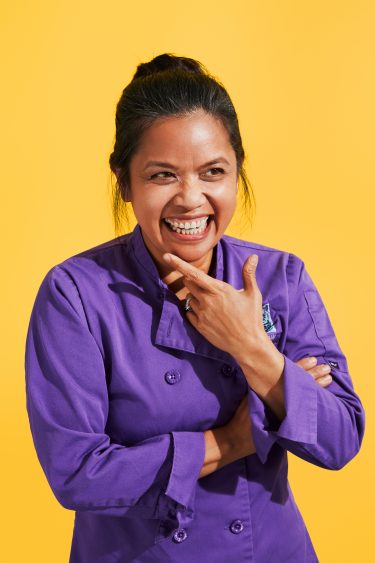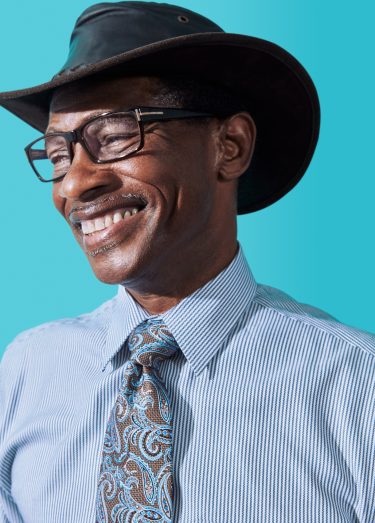Foster School’s
business incubator
serves up success
Foster School’s
business incubator
serves up success
Foster School’s business incubator serves up success
The school's Consulting and Business Development Center boosts entrepreneurs from underserved communities.
By Julie Davidow | Photos by Quinn Russell Brown | Viewpoint Magazine

Odette D’Aniello taught herself to decorate cakes when she was 10 years old. Not for a class project or an Instagram story, but to escape the tedious job of slicing hundreds of loaves of bread every afternoon at her uncle’s bakery in Guam.
“It was the culture of my family,” says D’Aniello, whose aunt and uncle paid for her parents, sister and brother to move from the Philippines to Guam in 1980 to help at their bakery. “We were just workers.”
Still dressed in her Catholic school uniform, she would sneak away from the slicers and into the decorating room and practice writing her name in frosting. “Before I was 11, I could decorate cakes with my eyes closed.”
Nearly four decades later, D’Aniello tells her story surrounded by models of the wedding cakes her team creates at Celebrity Cake Studio in Tacoma. She owns and runs the parent company, Celebrity Gourmet Ventures, with her husband, David, and her younger sister, Mary Ann Quitugua. They started their business almost 20 years ago. Along the way, they relied on the Foster School’s Consulting and Business Development Center to make the leap from talented cake decorators to successful entrepreneurs whose company now distributes hundreds of products nationwide.

Odette D’Aniello
The UW-based center—a national leader in providing management education, access to financial support, and markets for businesses owned by people of color, women, LGBTQ, veterans and those in underserved communities—is celebrating its 25th anniversary next year. “Most business schools in this country still do not have anything that engages students and faculty with businesses in underserved communities,” says Michael Verchot, co-founder and director of the center.
In 1993, when Verchot started his MBA at the UW, Seattle was wrestling with change. Boeing was still the largest employer and economic engine for the region, but the successes of Microsoft and other tech companies were offset by businesses and areas of the city, including the Central District, that were struggling. “At that point, it was really more about neglect and lack of investment” in the Central District and Southeast Seattle, Verchot says.
At the business school, Verchot joined a group led by marketing professors Thaddeus Spratlen and David Gautschi, along with Ali Tarhouni, a senior lecturer in business economics, and Paul Pressley, another MBA student, to ask why small businesses owned by people of color underperformed while other business thrived. Guided by Spratlen’s research, they sought to identify what the UW could do about it. As business faculty at a public university, the center’s founders agreed it was their responsibility to build relationships with businesses in underserved communities.
Spratlen had led student projects with African American-owned businesses in the Central District for years, but the opportunity arose to establish an ongoing center when William Bradford, the Foster School’s first African American dean, was hired in 1994. Bradford’s research focuses on black business development and continues to inform the center’s mission. “There was a whole segment of the business community that we weren’t serving,” Verchot says.
More than two decades later, the center has provided courses on management education and support from student consulting teams for hundreds of businesses owned by people of color, women and other underserved groups. It also places graduate students on the boards of nonprofits that serve more than 2.5 million Puget Sound-area residents. Its work has generated an estimated $200 million in revenue and helped create or retain more than 200,000 jobs in the state.

Chicken from Ezell’s Famous Chicken
“We want to invest in businesses that can build wealth and create jobs for people who live in those communities.”
Michael Verchot, co-founder of the Consulting and Business Development Center
Giving business students at the Foster School a chance to work in the community was a key component of the center from its earliest days. But the focus on experiential learning was unusual when the center started in the mid-1990s and not entirely embraced by the academic community, Verchot says.
Today, the center’s model of connecting students with small businesses and providing resources for owners is a national program that has expanded to 12 cities. The programs connect business schools, nonprofit community development financial institutions and business associations with local businesses. “We want to invest in businesses that can build wealth and create jobs for people who live in those communities,” Verchot says.

Lewis Rudd is a co-founder of Ezell’s Famous Chicken, which has welcomed a number of student teams over the years. Rudd and partner Faye Stephens also helped the Foster School’s center reach other underrepresented minority-owned businesses.
Lewis Rudd, CEO of Ezell’s Famous Chicken, remembers the first student team back in 2004 that devoted weekend and evening hours to studying the workflow at the restaurant’s original location across from Garfield High School. “They were just bright students, full of energy,” Rudd says. The subtle changes they suggested, including self-serve soft drinks and separate chef stations for the spicy and regular chicken, improved the store’s efficiency and increased sales by 40 percent. Since then, the company has expanded to 13 stores.
Most important, Rudd says, Verchot has always understood the challenges of running a small business for people of color in Seattle. “We’re still today benefiting from those meetings with the students,” says Rudd. “Through them we learned how to create a company that’s built for growth.”
In addition to supporting businesses, the center has guided many students to find their calling. Georgette Bhathena, ’00, says her time with the center helped her meld her values and career goals. Bhathena worked in corporate philanthropy for JPMorgan Chase and was later the director of Partnership for the Bay’s Future, a collaboration of businesses and foundations supporting affordable housing in the San Francisco Bay Area. She recently became senior director of grantmaking at Tipping Point Community, a nonprofit that uses corporate and individual donations to fight poverty. “You can see a theme,” Bhathena says. “The center helped me think about how to leverage my business school background for social good.”
Khatsini Simani’s summer internship linking small businesses with financing was a natural fit for her interests—professionally and personally. Simani, who grew up in Seattle, left college after one year to avoid graduating buried in student loan debt. Instead, she worked for five years to ground herself financially before returning to college.
This fall, Simani, ’19, started a Ph.D. program at the UW’s Information School. She’s interested in teaching financial literacy to young people—especially those from economically disadvantaged backgrounds. Understanding money and how it can shape your life is an important skill, Simani says. “I don’t think that’s something that should be reserved for people with more fiscal resources.”
Leull Belete, who graduated from UW Bothell in June, was one of the center’s two consulting interns this summer—and the first Nate and Leslie Miles Family Endowed Summer Intern. He spent his internship researching market conditions for a Central District nonprofit that helps local residents open small businesses.

D’Aniello’s experience at the center helped turn a talent for cake decorating into a thriving business.
As an engineering major, Belete is trained to find elegant solutions to tricky problems. But many concerns cannot be addressed with technical savvy alone. Money and access to capital is often the key, Belete says. Through the center, he helps entrepreneurs draft business models that set them up for success. “I’m hoping to create a roadmap that can help people in this community keep up with the growth in Seattle, create businesses and take care of their families.”
At Celebrity Cake Studio, D’Aniello does not hesitate when asked if baking was her long-term plan: “Never!” She graduated from the University of Arizona in 1992, worked abroad as a teacher for five years and applied to a Ph.D. program in education at the UW. When she didn’t get in, D’Aniello and her husband moved back to the United States anyway. Quitugua, who was 18 at the time, came along.
The trio started their lives as business owners with a cafe in Lacey. The lunchtime lines regularly stretched out the door, but their overhead costs were too high and they were always operating in the red. After stumbling across a wedding show at the Tacoma Dome, D’Aniello realized she could use the skills she had honed as an overworked kid to start a specialty business. “One day we were a cafe, the next day we were a cake studio,” Quitugua says.
D’Aniello describes her experience at the center as a mini-MBA program where she learned about the supply chain, profitability and efficiencies from experts in the field while still running her business. “I can go to the UW, come back here, and I have a totally different perspective,” she says. “My decision making is clearer.”
In the past three years, Celebrity Gourmet Ventures, which employs about 20 people, has acquired two new businesses: Wax Orchards, a fudge sauce sold in grocery stores around the country, and Dragonfly Cakes, a Sausalito, Calif.-based petit four company. The tiny cakes are now made at and distributed from the Tacoma store.
“To create a business this happy and thriving,” D’Aniello says, “is quite miraculous considering where we came from.”
The business boosters
A core group of alumni, business owners and business leaders have generously provided support to the Consulting and Business Development Center over the past 24 years.
Steve Boyer, ’76, ’92
A public relations professional, Boyer has served on the center’s board, mentored undergraduates, and shared his expertise as a consultant.
William Bradford
Bradford was dean when the center started. His research, particularly on entrepreneurs of color, has driven the center’s work.
Phyllis Campbell, ’87
Campbell is local leader and global visionary for using colleges and universities to support the growth of businesses owned by people of color. She helped build a national network of entreupreneurial support organizations, and often speaks in classes and meets with students.
Craig Dawson, ’85
An early client for the student consulting program, Dawson has served on the board for nearly 15 years. He also helps the center connect with African American-owned businesses.
Jai-Anana Elliott, ’12
As a Foster School employee, Elliott led efforts to increase diversity among the students. Today the effort has become the Young Executives of Color program, which reaches 175 high school students each year.
Isa Forenza, ’10
A principal of Legacy Trading, LLC, Forenza participated in the Minority Business Executive Program and more recently funded scholarships so more Latinx business owners could attend.
Dan Gandara and Dave Gandara, ’90
The Gandaras helped establish the Ernest I.J. Aguilar Endowed Scholarship for Latino MBAs and set the model for endowed scholarships at the school.
Chandra Hampson, ’00
As an MBA student, Hampson worked with the center to launch its work with tribes, tribal enterprises and Native American-owned businesses.
John Hartley, ’75
A coach and mentor to the center, Hartley has helped the center support and motivate its own employees, decrease turnover and improve outcomes for students and clients.
Fernando Hernandez
A Microsoft executive and long-serving CBDC advisory board member, Hernandez helped launch the national network. He also was a founding corporate partner in the Minority Business Executive Program.
Ed and Bob Kershaw, ’61 and ’60
The Kershaws helped the center scale up its work in the Yakima Valley and provided financial support and strategic advice to create and operate a program teaching business and finance there.
Leslie Lum
A long-serving advisory board member who helped the center partner with community colleges, Lum also co-wrote the center’s textbook.
Bill Marshall, ’83
Marshall is a founding board member, a mentor to students and a major recruiter of other business people to work with students.
Fernando Martinez
Helped establish the Minority Business Executive Program and now works with the center to secure corporate sponsors and connect businesses owned by people of color with corporate supply chains.
Neil McReynolds ’56, ’75
A founding co-chair for the center, McReynolds helped build partnerships with Seattle Rotary. As a business leader, he helped provide the center with credibility in its early years.
Nate Miles, ’82
A corporate executive, Miles has served for 25 years as an adviser, coach and champion for the center’s work. With his family, he established and endowed a summer internship.
Tomio Moriguchi ’59, ’61
Moriguchi’s business, Uwajimaya, was an early client for the student consulting program. He has continued to be a voice of support for the center’s work, served on the board and promoted multigenerational partnerships between the African American and Asian Pacific Islander communities.
Assunta Ng, ’74, ’76, ’79
Ng is a longtime mentor for student consulting teams and a leader for fundraising. As publisher of the Northwest Asian Weekly, she has raised the center’s profile in the Asian and Pacific Islander business communities.
George Northcroft
Northcroft is a force behind how the center measures and evaluates its effectiveness. He also helped establish the first endowed scholarship for African American MBA students at the UW.
Lynn Palmanteer-Holder
As UW’s tribal liaison, Palmanteer-Holder connected the center with tribal leaders and businesses. She also helped launch the certificate program in tribal gaming and hospitality management, a first for a non-tribal college.
Connie Proctor, ’78
As a local philanthropic leader and a UW Regent, Procter helped raise the center’s proifle around campus and in the community. She also helped establish MBA scholarships for Latino and African American students.

Ezell’s Famous Chicken has benefited from its relationship with the Foster School.
Lewis Rudd and Faye Stephens
Two of the founders of Ezell’s Famous Chicken started as clients and have welcomed a number of student teams into their business over the years. Rudd and Stephens also helped the center reach other underrepresented minority owned businesses.
Martha Sandoval, ’04, ’07
As a student, Sandoval consulted with the center and helped with research into African American entrepreneurs. She also connected the center with the UW law school and the small-business law clinic. Today, as a corporate practice partner at Perkins Coie, she supports the center with law seminars and pro bono legal advice to clients.
Shaun and Brooke Spearmon, ’11 and ’09, respectively
The Spearmons worked with the center and have supported the minority business community in myriad ways, including helping to create the Minority Business Executive Program and a supplier diversity toolkit to help corporations launch their own supplier diversity programs. Both have served on the board.
Thaddeus Spratlen
The first African American faculty member at the Foster School, Spratlen was the center’s founding director. His curriculum and teaching materials are still largely in use.
The 2019 Impact Awards
Dec. 5, 5:30 p.m., The Westin Seattle
Join the Foster School and the Consulting and Business Development Center in December to recognize business, civic, and student leaders who are committed to diversity, equity, and inclusion in business.
The annual Impact Awards dinner celebrates businesses owned by people of color and the work that business and civic leaders take to ensure equity business opportunities in the Northwest. It is one of the largest Foster School events every year. This year’s event will kick off 25 years of Consulting and Business Development at the UW.
Individuals, corporations and civic leaders will be recognized for their impact in growing businesses and jobs in underserved communities across Washington and in accelerating students’ careers.
Proceeds from the Impact Awards support undergraduate students build business skills while working with diverse businesses in underserved communities.
You can register online or contact Rebecca Thornton at thornra@uw.edu or 206-543-5458 for more information.